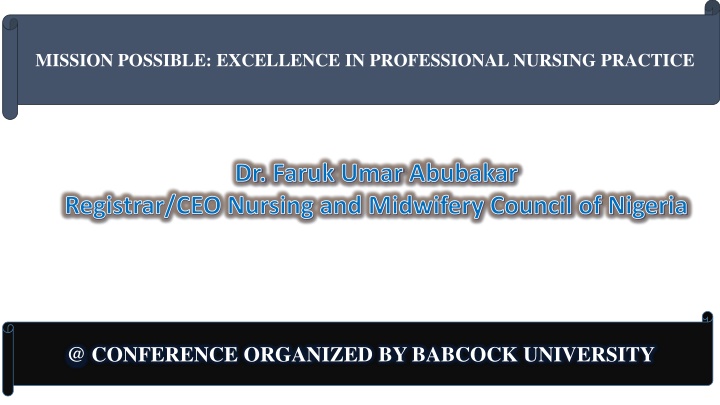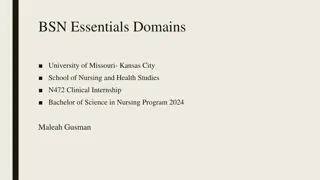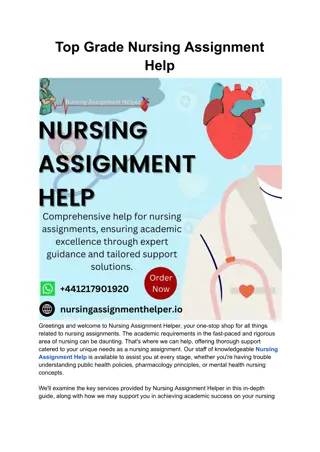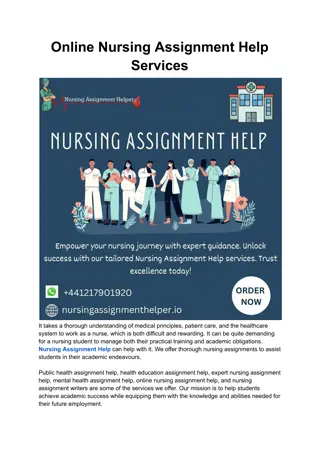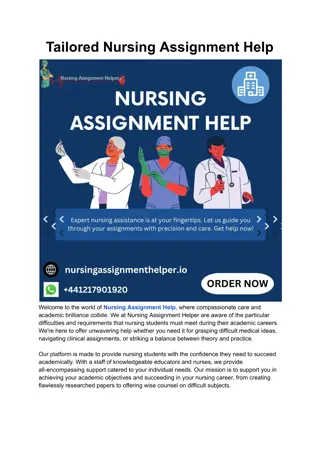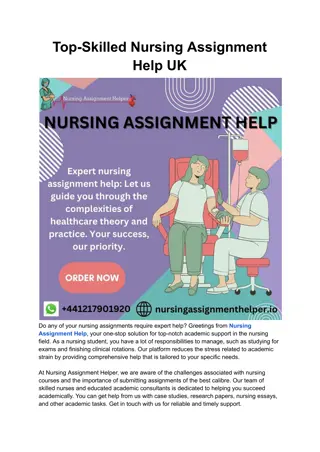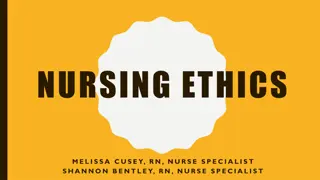Cultivating Excellence in Professional Nursing Practice
Nursing excellence goes beyond technical skills, emphasizing continuous learning, compassionate care, and community well-being. It involves developing strong nurse leaders, promoting autonomy, and ensuring patient safety for quality outcomes. Key components include clinical competence, evidence-based practice, compassion, and leadership.
Download Presentation

Please find below an Image/Link to download the presentation.
The content on the website is provided AS IS for your information and personal use only. It may not be sold, licensed, or shared on other websites without obtaining consent from the author.If you encounter any issues during the download, it is possible that the publisher has removed the file from their server.
You are allowed to download the files provided on this website for personal or commercial use, subject to the condition that they are used lawfully. All files are the property of their respective owners.
The content on the website is provided AS IS for your information and personal use only. It may not be sold, licensed, or shared on other websites without obtaining consent from the author.
E N D
Presentation Transcript
MISSION POSSIBLE: EXCELLENCE IN PROFESSIONAL NURSING PRACTICE Dr. Faruk Umar Abubakar Registrar/CEO Nursing and Midwifery Council of Nigeria @ CONFERENCE ORGANIZED BY BABCOCK UNIVERSITY
OUTLINE OF THE PRESENTATION Introduction Concept of Nursing Excellence Components Associated with Nursing Excellence Principles of Everyday Excellence Essential Elements that Contribute to Nurturing Excellence in Nursing Practice Cultivating Compassionate Care: The Heart of Nursing Promoting a Culture of Well-Being Conclusion
Introduction 1/1 Nursing, often described as the heart of healthcare, is a dynamic and evolving profession that requires a delicate balance of compassion and expertise. Nurturing excellence in nursing practice goes beyond the acquisition of technical skills. It involves fostering a culture that values continuous learning, empathetic care, and a commitment to the well- being of individuals and communities.
Concept of Nursing Excellence Nursing excellence is about developing and advancing strong nurse leaders, who are then able to advocate for their patients and nurse peers. It requires a structure within the organization that supports shared governance and involved in decisions making, measuring transparency and establishing performance benchmarks Promoting autonomy for nurses inside that shared governance framework
Nursing Excellence Contd Healthcare has long valued the patient, striving for good clinical quality outcomes. Patient safety is essential to clinical quality outcomes, can hesitate to human error in the most unfortunate cases, despite best efforts Optimizing first-class working environment in ensuring excellence that includes the leadership development plan and providing incentives to professionalism
Nursing Excellent Contd Nursing excellence can be defined in various ways, but it generally refers to the high level of quality care, professionalism, leadership, and commitment that nurses demonstrate in their practice.
KEY COMPONENTS ASSOCIATED WITH NURSING EXCELLENCE 1/1 Clinical Competence: It involves possessing a high level of clinical knowledge, skills, and expertise Evidence-based practice for professional development. Compassionate Care: Demonstrate empathy, and respect prioritize the holistic needs of the individual
COMPONENTS ASSOCIATED WITH NURSING EXCELLENCE 1/2 Critical Thinking and Problem-Solving: Think critically, analyze situations, and make sound decisions Proactive in identifying and addressing issues Effective Communication: Involves clear and effective communication Good communication skills are essential for building trust, fostering collaboration, and ensuring continuity of care.
COMPONENTS ASSOCIATED WITH NURSING EXCELLENCE 1/3 Advocacy: patients' rights, preferences, and best interests. Serve as a voice to ensure that patients receive the highest quality of care. Leadership and Collaboration: Ability to lead by example, mentor others, and join forces effectively to improve patient care outcomes.
COMPONENTS ASSOCIATED WITH NURSING EXCELLENCE 1/4 Commitment to Professionalism: Adhere to high ethical standards, Maintain confidentiality, and Demonstrate integrity in all aspects of their practice. Take responsibility for their actions, Obtain feedback for continuous improvement
PRINCIPLES OF EVERYDAY EXCELLENCE 1/1 PRINCIPLES OF EVERYDAY EXCELLENCE 1/1 The framework of everyday excellence intends that nurses are empowered to enact the professional values, best practices, and caring spirit of geriatric nursing when it is integrated into and supported by the structures and processes of a long-term care organization. An underlying assumption of this framework is that the RNs who work in nursing homes are capable of creating, implementing, and sustaining site- specific professional practice models based upon the eight principles of Everyday Excellence:
PRINCIPLES OF EVERYDAY EXCELLENCE 1/2 PRINCIPLES OF EVERYDAY EXCELLENCE 1/2 Principle 1: Valuing Excellence Demonstrate that we measure the meaningful work we do as professional nurses Principle 2: Envisioning Excellence Shared on philosophy of caring, Recognized nursing standards, Responsive to resident needs and Strategic goals of the organization.
PRINCIPLES OF EVERYDAY EXCELLENCE 1/3 PRINCIPLES OF EVERYDAY EXCELLENCE 1/3 Principle 3: Peopling Excellence Consider geriatric nursing a desirable, Enriching, and challenging clinical specialty and demand positions of responsibility, leadership, and professional Nursing care settings. Principle 4: Securing Excellence Professional nurses secure excellence in our workplaces by creating care settings that all people experience as healthy, respectful, and safe.
PRINCIPLES OF EVERYDAY EXCELLENCE 1/3 PRINCIPLES OF EVERYDAY EXCELLENCE 1/3 Principle 5: Learning Excellence Thrive in intellectual climates where this specialized knowledge forms the basis for excellence in professional nursing practice . Principle 6: Empowering Excellence Empower and respect ourselves as a member of interdisciplinary healthcare team to achieve excellence in resident care.
PRINCIPLES OF EVERYDAY EXCELLENCE PRINCIPLES OF EVERYDAY EXCELLENCE Principle 7: Leading Excellence Create organizational structures that facilitate collaborative practice Cross-organizational initiatives to achieve excellence in Nursing Care. Principle 8: Advancing Excellence New visions of excellence through a commitment to research Application of technological innovations and evidence-based practices, Dedication to social policies that achieve equitable, high quality, and compassionate heath care for all.
Essential elements that contribute to nurturing excellence in nursing practice 1/1 Continuous Learning: Constantly advancing with new medical discoveries, technologies, and treatment modalities. Commitment to continuous learning. Abreast of the latest research Professional development programs Professional Development Opportunities: prioritize ongoing professional development opportunities for nurses. Enhance clinical skills to foster leadership and critical thinking.
Essential elements that contribute to nurturing excellence in nursing practice 1/2 Encouraging Higher Education: Pursuing higher education elevates the overall standard of nursing practice. Mentorship Programs: creates a supportive environment for less experienced nurses. Share their knowledge, provide guidance, and instill a sense of confidence in their mentees.
Cultivating Compassionate Care: The Heart of Cultivating Compassionate Care: The Heart of Nursing Nursing The human touch and empathetic connection between a nurse and a patient are powerful healers. Nurturing compassion involves: Empathy Training: Develop the ability to understand and share the feelings of their patients. This humanizes the care process and fosters trust.
Cultivating Compassionate Care: The Heart of Nursing Patient-Centered Care: Encouraging and ensures that care is tailored to the unique needs, preferences, and values of each individual. involving patients in decision-making, and acknowledging their emotional well-being. Recognition and Appreciation: Acknowledging contributes to a positive work environment. Feeling valued and recognized motivates nurses to deliver care with passion and dedication. Embracing Innovation and Technology The landscape of healthcare is continually shaped by technological advancements. Involves embracing innovation and integrating technology to enhance patient care.
Cultivating Compassionate Care: The Heart of Nursing Training in Health Informatics: ensures that nurses can effectively navigate electronic health records (EHRs) and leverage technology to streamline processes. Telehealth Integration: Equips nurses to provide care remotely Adapt to evolving models of healthcare delivery. Simulation Training: Allow nurses to practice their skills in a controlled environment, Ensuring readiness for real-life scenarios.
Promoting a Culture of Well Promoting a Culture of Well- -being being Nurses are dealing with high-stress situations and demanding schedules which involves recognizing the importance of nurse well-being. Flexible Schedules: Achieve a better work-life balance Reducing burnout and enhancing overall job satisfaction. Mental Health Support: promotes emotional well-being among nurses cknowledging the challenges they may face in their roles. Physical Well-being Programs: Ensures that nurses are physically equipped to handle the demands of their profession.
CONCLUSION In conclusion, nurturing excellence in nursing practice requires a holistic approach that integrates continuous learning, compassionate care, technological proficiency, and a focus on well-being. Nurses play a pivotal role in shaping positive patient outcomes and contributing to the overall success of healthcare systems. Investing in the professional development of nurses the quality of patient care but also honor the dedication and compassion inherent in the nursing profession.
CONCLUSION Overall, nursing excellence is about striving for the highest standards of care, constantly seeking opportunities for growth and improvement, and making a positive impact on the lives of patients and the healthcare community. Nurturing excellence in nursing is not just a goal; it is a commitment to creating a healthcare environment where both nurses and patients thrive
